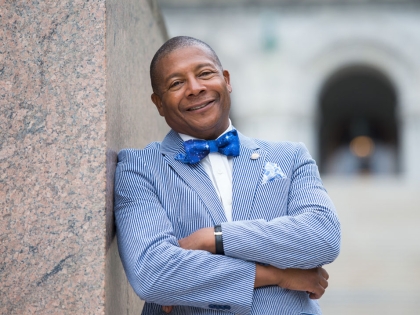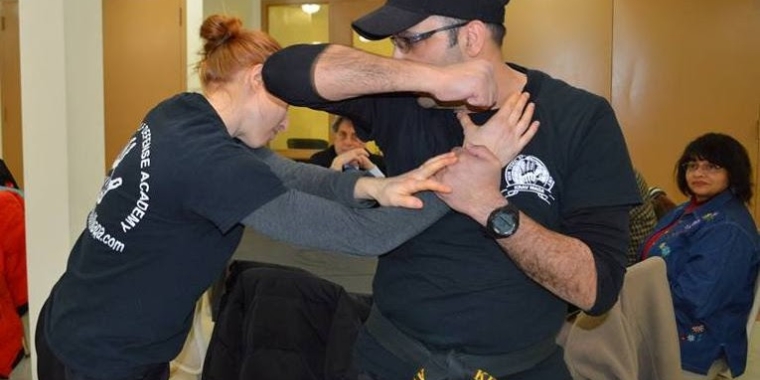In recognition of Sexual Assault Awareness Month (SAAM), State Senator James Sanders Jr. (D-Rochdale Village) hosted a defense training and prevention event to educate community members on how to protect themselves from becoming the victim of a sexual assault. Information on resources for survivors including support services, counseling, and legal rights were also presented. Some 40 people participated in the program, which was held yesterday at Praise Tabernacle Church in Jamaica.
“Sexual assault is a serious crime that affects the physical and emotional well-being of survivors long after the attack is over,” Senator Sanders said. “We are here today to raise awareness of this type of violence and do our part to educate as many people as we can in an effort to prevent future incidents from occurring, and to encourage those who have been victimized to seek help.”
One in three women and one in eleven men will be the victims of sexual assault at least once in their lifetime, according to the National Sexual Violence Resource Center, which cites data from the FBI and Journal of Traumatic Stress. It is estimated that there is one sexual assault every 90 seconds in the United States.
Connie Pacheco, president of Recoveries R US, a vocational training program, located in Inwood, New York, bravely shared her own personal story of survival. After many years of being sexually assaulted, first as a child by family members, and then later in life by strangers, Pacheco said she blamed herself for being victimized and felt embarrassed and ashamed.
Pacheco started using drugs in order to cope. Eventually she sought treatment which helped turn her life around. She also took self defense classes and continued her formal education, which boosted her self confidence. The most significant turning point, however, occurred after Pacheco’s now ex-husband physically attacked her, grabbing her by the neck and attempting to choke her. She quickly and instinctively fought back, elbowing him to the face and breaking his nose.
“I decided right then and there – I am nobody’s punching bag,” she said. “I am not anyone’s possession. I am a human being. I am a woman. I have a lot to offer, and I matter.”
The centerpiece of the event was a live safety demonstration conducted by Avi Avramcheyiv, the founder and chief instructor of NY Self Defense Academy and a former hand-to-hand combat instructor with the Israeli military. He taught attendees how to fight off an attacker who is armed with a knife or a gun, as well as how to escape from a variety of other scenarios such as being choked, pinned to the ground or against a wall.
“It’s very simple to defend yourself,” Avramcheyiv said. “All you need are a pair of hands, a pair of legs, fingernails, teeth, and you’re fine.”
When it comes to what constitutes a sexual assault, two of the biggest factors are consent and incapacitation, according Sgt. Gregory Accomando of the NYPD Special Victims Division. He explained that once a person clearly communicates that they do not want a sexual act to be initiated or continue it must stop, or it becomes illegal. Also, when someone is incapacitated to the point where they are not able to convey non-consent of a sexual activity either verbally or physically and it still occurs that is also illegal. He added that sexual assaults go largely unreported with only about 40 percent of incidents being brought to the attention of police.
“If you’re with someone that discloses to you that they have been the victim of sexual assault, don’t judge them,” Accomando said. “Don’t judge the situation. Don’t judge what they did. Only assess the facts and if they would like to report it to the police, please encourage them to do so.”
Josie Torielli, a licensed clinical social worker with the NYC Alliance Against Sexual Assault, which represents rape crisis centers across New York City and provides direct care and training along with prevention in the area of sexual violence, also offered advice on how to interact with victims.
“Sometimes our anxiety and fear of saying the wrong thing leads us to say nothing, and for someone who’s a survivor that can feel pretty terrible,” Torielli said. “You can’t prevent someone from hurting. You can’t undo what has happened to them, but you can listen and be present.”
When a victim of sexual assault goes to a hospital for treatment, they are often scared and unaware of the procedure for treatment. Melissa Saravia, a Registered Physician Assistant with Jamaica Hospital, spoke about some of the steps that take place. The victim is escorted to a private area of the emergency room for confidentiality and security reasons. The individual doesn't have to file a police report if they choose not to. A social worker helps ascertain the patient’s plan for the next 24 hours, examines their safety concerns, and may serve to help the victim explain to his or her family and friends what has happened to them in regards to the assault. A physical exam is conducted to assess any injuries and the victim is made aware that treatment for sexually transmitted diseases and emergency contraception can be administered. A sexual assault forensic exam known as a rape kit may also be performed.
Kirlyn Joseph of Queens Law Associates addressed the topic of legal rights for victims, including having an order of protection in place, filing a lawsuit against an attacker, and submitting a victim impact statement to the court. “Some of the most compelling words can come from the survivor if they are able to speak to the court and share with the court the trauma they have endured, and that will greatly affect the sentence ” Joseph said. “It’s even impactful in cases that end in a plea.”
Lyn Johnson, veteran outreach specialist and minority veteran coordinator with the VA NY Harbor Healthcare System, spoke about Military Sexual Trauma, which is a term the VA uses to refer to sexual assault or repeated, threatening sexual harassment occurring during a veteran's military service. One in four women and 1 in 100 men self identify as having suffered from MST, Johnson said. Every VA facility has a military sexual trauma coordinator, two licensed clinical social workers and a clinical psychiatrist that can assist victims, even if they have been dishonorably discharged from the military.
Also featured at the event were organizations that offer support services and counseling for victims of sexual assault and domestic violence such as the Mount Sinai Sexual Assault Survivor Program, NYC Center Against Domestic Violence and Safe Horizon.
We would like to thank the police officers from the 103rd, 105th and 106th precincts who attended the event to show their support. We would also like to thank our community co-sponsors, United Neighbors Civic Association, Community Board #13 and the Rosedale Civic Association, as well as Praise Tabernacle Church for allowing us to use their space. |


